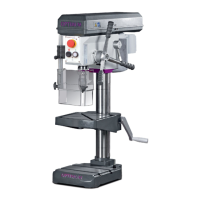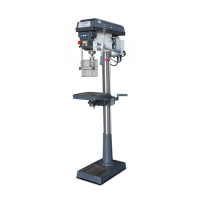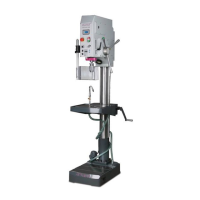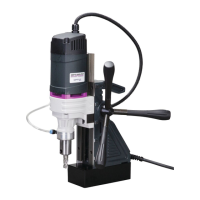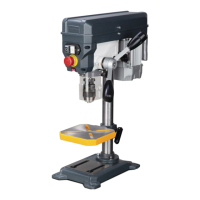Do you have a question about the Optimum OPTIdrill B 40GSP and is the answer not in the manual?
Explains symbols and their meanings for safe operation and understanding warnings.
Displays machine identification, manufacturer, and key technical details for reference.
Details hazard classification, warning alerts, and their potential consequences for users.
Defines the machine's specific purpose and limitations for safe and proper operation.
Outlines prohibited uses and potential dangers that may arise from misusing the machine.
Specifies required training and qualifications for operating and maintaining the machine safely.
Identifies individuals permitted to operate and maintain the machine based on their training.
Indicates the standard location for the operator during the machine's operation.
Provides essential precautions and safety practices to follow while operating the machine.
Lists and describes the machine's built-in safety features for user protection.
Outlines procedures for performing safety checks before and during machine operation.
Lists required personal protective equipment (PPE) for safe operation and specific tasks.
Emphasizes critical safety precautions and best practices for operating the machine.
Covers essential safety procedures required for performing maintenance and repair tasks.
Instructs on reporting accidents, near misses, and safety-related incidents promptly.
Details safety requirements, checks, and compliance for the machine's electrical components.
Specifies mandatory inspection intervals and regulatory compliance for overall machine safety.
Specifies electrical requirements, voltage, power, and protection degree for the machine.
Lists the machine's capabilities for drilling and tapping various materials like steel and cast iron.
Details the spindle taper type and feed specifications for tool holding and operation.
Provides dimensions, T-slot size, and work area specifications for the machine's table.
Specifies the overall dimensions and weight of the machine for installation planning.
Lists the available spindle speed ranges in RPM for different operational requirements.
Outlines recommended operating temperature and humidity ranges for optimal performance.
Specifies recommended oils and lubricants for various machine components.
Details specifications for the coolant system, including pressure, tank capacity, and flow rate.
Provides information on noise emission levels during operation at the operator's position.
Presents detailed physical dimensions of the machine with diagrams and measurements.
General guidelines and warnings for safe transport, installation, and initial setup.
Highlights dangers like tilting and specifies precautions for moving the machine safely.
Instructions for safely removing the machine from its packaging and inspecting for damage.
Lists the components and accessories included with the machine for verification.
Information on centers of gravity, load suspension points, and appropriate transport methods.
Step-by-step instructions for assembling and setting up the machine, requiring multiple people.
Identifies specific points for attaching lifting gear when the machine is unpacked.
Procedures for installing the machine, ensuring a level and stable foundation.
Describes methods for securely anchoring the machine to its base using appropriate hardware.
Provides a visual guide illustrating the correct assembly of the machine's components.
Instructions for cleaning the machine after unpacking and before initial operation.
Guides on checking and filling oil levels and changing oil at specified intervals.
Details on connecting the machine to the power supply, including voltage and fuse requirements.
Procedures and precautions for the initial startup and testing of the machine.
Lists pre-operation checks required before starting the machine to ensure safety and functionality.
Information on the coolant pump's operation and potential issues like incorrect rotation.
Procedure for warming up the machine's spindle before full load operation to prevent damage.
Identifies and explains the function of the machine's various controls and indicators.
General safety precautions to be followed while operating the machine.
Details the functions of buttons, switches, and indicators on the main control panel.
Explains how to set and use the drill depth stop for precise drilling depth control.
Describes manual and automatic methods for operating the spindle sleeve feed.
Procedures for attaching and detaching tools, including the drill chuck.
Step-by-step guide for safely removing the drill chuck from the spindle.
Instructions for installing the drill chuck securely onto the spindle taper.
Explains the importance and methods of using cooling lubricants during drilling operations.
Pre-operation steps, including workpiece clamping and depth adjustment.
Guidance on safe practices and potential hazards during drilling operations.
Provides tables for recommended cutting speeds and feed rates based on material processed.
Lists spindle speeds (RPM) corresponding to various cutting speeds and drill diameters.
Demonstrates how to calculate the correct spindle speed using formulas and provided tables.
General overview of inspection procedures for machine safety and performance.
Procedures for routine maintenance tasks to ensure proper functioning and longevity.
Guidance on when and how to perform repairs on the machine, emphasizing qualified personnel.
Critical safety warnings related to maintenance and repair activities to prevent injury.
Steps required before starting any maintenance work, including power disconnection.
Procedures for safely restarting the machine after maintenance or repair.
Details intervals and tasks for daily and regular inspections of machine components.
How to check and maintain the oil level in the spindle sleeve gear unit.
Step-by-step guide for replacing the gear oil in the spindle sleeve.
How to check the oil level in the gear unit for the spindle sleeve feed.
Instructions for changing the gear oil for the spindle sleeve feed.
Lubrication points and intervals for the drill column and rack.
Maintenance information and procedures for the coolant pump.
Contact information and procedures for requesting professional repair services.
Guidelines for maintaining cooling lubricant quality and cleaning lubricant tanks.
A schedule and methods for inspecting water-mixed cooling lubricants.
Information required when ordering spare parts, including machine and part details.
Contact details for the dedicated spare parts hotline.
Contact details for general machine service inquiries and support.
Diagram and identification of the main spindle gearbox components.
Exploded view of the first part of the main spindle gearbox assembly.
Exploded view of the second part of the main spindle gearbox assembly.
Exploded view of the third part of the main spindle gearbox assembly.
Exploded view of the fourth part of the main spindle gearbox assembly.
Part list for the main spindle gearbox assembly, with item numbers and descriptions.
Diagram and identification of the feed gear box components.
Exploded view of the first part of the feed gear box assembly.
Exploded view of the second part of the feed gear box assembly.
Exploded view of the third part of the feed gear box assembly.
Exploded view of the fourth part of the feed gear box assembly.
Part list for the feed gear box assembly, with item numbers and descriptions.
Diagram and identification of parts for the column and drilling table.
Part list for the column and drilling table assembly, with item numbers and descriptions.
Exploded view and part list for the drilling chuck guard assembly.
Illustrations and identification of various machine labels and plates.
Electrical schematic illustrating the machine's wiring system and components.
Part list for the electrical components of the machine, including switches and motors.
Outlines the terms and conditions for warranty claims and defects.
Guidelines for proper storage of the machine and its components to prevent damage.
Instructions for environmentally friendly disposal and recycling of the machine and its parts.
Procedures for safely taking the machine out of service to avoid misuse and environmental hazards.
Guidance on recycling and disposing of packaging materials according to regulations.
Recommendations for the proper disposal of the used machine and its components.
Specific instructions for disposing of electronic parts according to legal requirements.
Procedures for environmentally safe disposal of used oils and coolants.
Information on disposing of devices via local collection points and recycling centers.
Lists changes and updates made to the operating manual across different versions.
Information on how to provide feedback or report issues with the machine post-purchase.
Official declaration that the product meets EU safety and health requirements.
